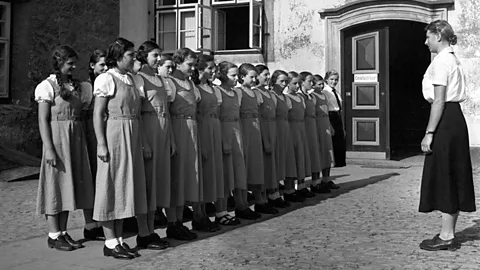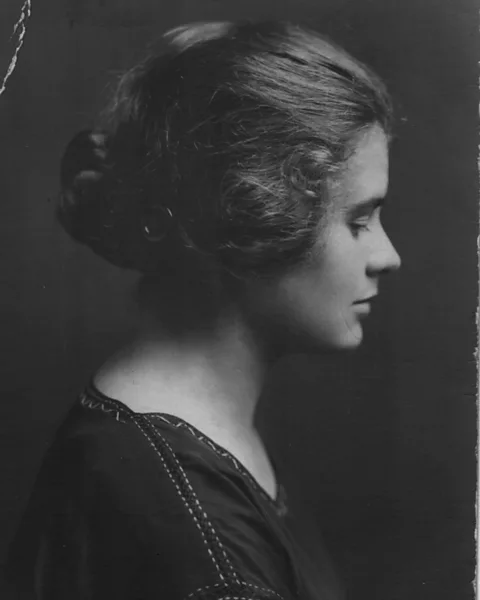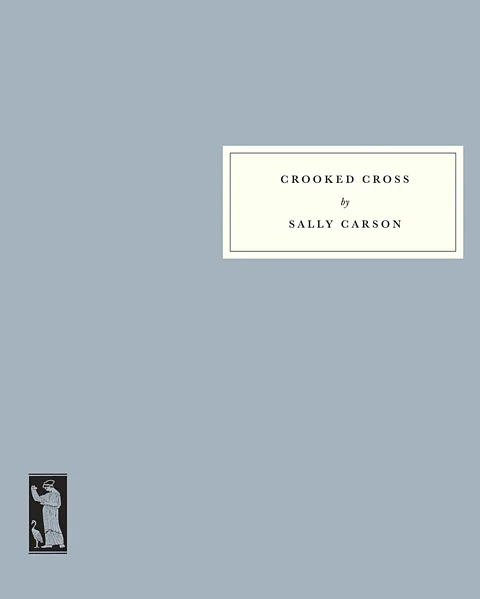The lost 1934 novel that gave a chilling warning about the horrors of Nazi Germany
 Alamy
AlamyPublished years before WW2, Sally Carson's prescient novel captures the dawn of Nazi tyranny in a small German town – and remains relevant today.
Eighty years after VE Day, enthusiasm for the World War Two novel remains undimmed.
Demand for tales of wartime Europe, always healthy, has swelled notably since the publication of Anthony Doerr's lyrical All the Light We Cannot See, awarded the Pulitzer Prize in 2015 and subsequently adapted into a Netflix series. Love stories, battle stories, codebreaker stories, resistance stories, concentration camp stories – all have landed on bestseller lists around the world.
And while many novelists in this sub-genre have drawn skillfully on documents, letters and eye-witness accounts eight decades old, the world is unlikely ever again, at this far remove, to see a new work of fiction based on personal experience of that era. Which is one reason Crooked Cross, republished this spring by Persephone Books, is such an extraordinary read. The author, Sylvia "Sally" Carson, a young Englishwoman, was inspired by visits to friends in Bavaria in the early 1930s to write a novel about the dawn of Nazi tyranny in a small German town.
The celebrated US novelist EL Doctorow, author of Ragtime, Billy Bathgate and other works of fiction set in the past, once said: "The historian will tell you what happened. The novelist can tell you what it felt like." And Carson's achievement is to bring to vivid life the fictional Kluger family, residing near the mountains south of Munich who over the course of six months – Christmas Eve 1932 to Midsummer Night 1933 – see their lives shattered.
Carson wrote Crooked Cross – the title refers to the swastika symbol adopted by the Nazis – at speed. It was published in 1934, a year after the events she recounts. Reviews were laudatory, and Carson turned her novel into a play that premiered at the Birmingham Repertory Theatre in 1935, transferring to London's West End two years later. Carson proved remarkably prescient about the horrors to come, and yet after her premature death, in 1941 from breast cancer, her novel sank into obscurity. Persephone's decision to reissue it now is a wise and welcome one.
 Persephone Books
Persephone BooksThe action opens when Hans and Rosa Kluger, and their three adult children – daughter Lexa, and sons Helmy and Erich – gather for the Christmas holiday. Life is hard in Depression-era Germany. Herr Kluger's salary at the Post Office has been cut, eldest son Helmy is out of work, and Erich's seasonal job as a ski instructor requires humiliating catering to the whims of rich women. But Christmas is "a time for the knitting together of personal happiness, and of completing the magic circle of their family," Carson writes. Lexa's handsome and successful fiancé, the young surgeon Moritz Weissman, is included in all the celebrations.
When Helmy and Lexa take charge of decorating the tree – the two siblings have always been close – the festive setting is described precisely, with a passing reference to "Helmy's picture of Hitler" that sits on the piano, decorated with fir twigs, like everything else in the cosy house. The scene lulls the reader into believing, despite the flicker of menace, that nothing can break this loyal, decent and loving clan.
A month later, in January 1933, Hitler is appointed Chancellor, and the Machtergreifung, as the Germans call the Nazi consolidation of power, begins. Within days, Helmy is rewarded for his early allegiance to the Nazis, and their promises to make the nation prosperous again, with a job as the local party secretary; Moritz, who has a Jewish father, is dismissed from the Munich clinic where he works.
Modern and personal parallels
Carson demonstrates compassion for all her characters, alongside razor-sharp insight into their very human weaknesses. Helmy, a sensitive, conscientious man, nonetheless falls into line with evil ideology. He tries to persuade his sister that, in the new reality, she must break off her engagement and never see Moritz again. Lexa resists, clinging to the hope that in faraway Berlin, Hitler will be tossed out of government.
Instead, as the mountain meadows turn green in the spring, the family's world darkens further. Erich quits his servile job to join the brownshirts, and swaggers around town in his uniform and jackboots – the Kluger parents feel intense pride, although Herr Kluger, a veteran of World War One, remains wary about another bloody conflict. The idealistic Helmy attends a Nazi rally and is mesmerised. Carson writes: "He had no warning of the destruction that would be caused by the setting free of that power for which he now shouted as hoarsely as the others… Hitler was to them like some splendid deliverer; a god… Their arms flew out in the same signal – a forest of stretching brown arms with the fingers pointing to the little god with a toothbrush moustache. Heil Hitler!"
 Alamy
AlamyMoritz, stripped of work and income, no longer even permitted to borrow books from the public library, falls into despondency. Seeking a carefree evening, Lexa persuades him to take her to a dance. On the crowded floor, while doing the foxtrot, the two accidently bump against another couple. Moritz turns to apologise. "Blast you!... you filthy Jew… Get out of the way," the other man shouts.
Carson told the Bradford Observer newspaper how she had heard these exact words thrown at the Jewish man who partnered her at a dance hall while she was on holiday in Bavaria.
On Midsummer Night, when the violence simmering under the surface in this idyllic corner of Germany explodes into clear view, Lexa conclusively chooses her love for Moritz over all other loyalties, and the results are devastating. (To say more would be to ruin the story.)
The novel, which concerned itself only with the domestic realm, still shows with chilling force how a civilised nation could be captured by authoritarianism. Speaking on the BBC Radio 4 news programme Today, Francesca Beauman – the historian who is the editorial director of Persephone Books – cited a review in the Acton Gazette at the time of the book's publication. "Crooked Cross is more truthful than telegraphed reports; it is fairer than propaganda, and it is more interesting than either."
Not all of Carson's contemporaries desired to hear the warning embedded in Crooked Cross. When her play moved to the London stage in 1937, some in Britain blasted it as anti-German, and the Lord Chamberlain's office insisted every "Heil Hitler" be removed. Much of the British establishment at that time hoped to peacefully co-exist with the bellicose regime in Berlin.
Some readers will be quick to draw modern parallels, especially to the rise of right-wing populism around the world, and the propensity for young men to be seduced by extremist movements, when they feel – as millions did in 1930s Germany – purposeless, disaffected or lost. But the real question that Crooked Cross raises is personal. What would you do if the people you love begin to espouse ideas you hate?
Now that Carson's indelible portrait of the tragic Kluger family has resurfaced, it warrants a permanent place in the growing canon of World War Two literature.
Crooked Cross by Sally Carson is published by Persephone Books, which reprints neglected fiction and nonfiction mostly by women.
Clare McHugh is the author of the historical novel, The Romanov Brides.
--
If you liked this story, sign up for The Essential List newsletter – a handpicked selection of features, videos and can't-miss news, delivered to your inbox twice a week.
